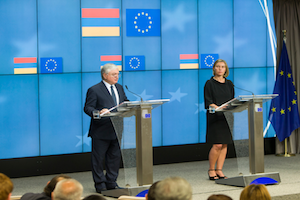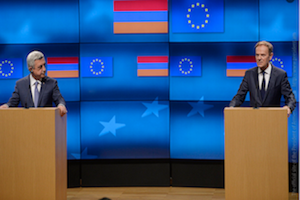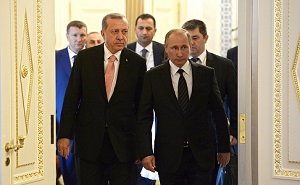Armenia Signs Framework Agreement with EU, Attracts Russian Ire
By Armen Grigoryan
December 21, 2017, the CACI Analyst
The new framework agreement between Armenia and the European Union creates some opportunities to implement governance reforms and to amend the legal framework, which would improve the investment climate. The new agreement excludes free trade provisions which would contradict Armenia’s commitment to the Russia-led Eurasian Economic Union (EEU). Meanwhile, EEU membership continues to undermine the welfare of Armenian citizens, despite previous official assurances, while the lack of political will deriving from both internal and external factors may potentially limit the government’s readiness to implement reforms.

Armenia's Rapprochement with the West Raises Premature Optimism
By Armen Grigoryan
September 25, 2017, the CACI Analyst
Whereas the Armenian government cautiously seeks opportunities to maintain and develop its relations with the West, the incumbent administration’s main priority is to maintain its own political and economic interests. It therefore strives to avoid internal instability or hostile reactions from Russia that could jeopardize the administration’s continued rule, as well as reforms that could endanger the oligarchic system’s grip on the economy. Despite the government’s official statements, the signing of a pivotal partnership agreement with the EU still depends on these priorities.

Weaker Turkey leaves the South Caucasus without Strategic Anchor
By Mamuka Tsereteli
February 17, 2017, the CACI Analyst
The weakening strategic position of Turkey will have a profound impact on the Black Sea-Caspian region and wider Central Asia. An assertive Russia and diminishing U.S. and Western engagement further limits Turkey's ability to play a pro-active role in the region. For regional actors in the South Caucasus, part of the solution should be to create the best possible conditions for transiting Asian cargos via Central Asia, the Caspian Sea, the South Caucasus corridor and the Black Sea to Bulgaria and Romania. This is how countries of the South Caucasus can bring new balancing powers to the region.

Israeli PM’s visit to the two sides of the Caspian Sea
By Avinoam Idan
February 6, 2017, the CACI Analyst
Israel’s Prime Minister Binjamin Netanyahu made a landmark visit to Azerbaijan and Kazakhstan in December 2016. The Israeli Prime Minister's visit reflects Israel’s growing interest in Central Asia and the Caucasus, a region that is part of Israel's greater strategic environment. Israel's interest in Kazakhstan focuses on its trade potential, its regional and international status, and its position as a vital link in the Chinese Belt and Road Initiative. Azerbaijan's geographical location, its role as a significant energy exporter, and its security approach have been foci of the close relations that have developed between Baku and Jerusalem over the years. The Prime Minister's visit reflects the continued deepening of ties with Azerbaijan.
Karakbakh negotiations on hold as Armenia gears up for parliamentary elections
By Armen Grigoryan
January 12th, 2017, The CACI Analyst
Further negotiations on the Nagorno-Karabakh issue seem to be practically postponed until Armenia completes its parliamentary elections in April 2017. At the same time, the government demonstrates an unwillingness to proceed beyond rhetoric with governance and economic reforms. The administration’s inability to deliver satisfactory economic results and ensure social development, as well as its close connections with Russia with a strong clientelism component, suggest a further growth of dependence and compliance with Moscow’s political agenda.





